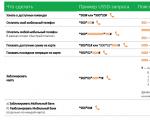What is offline mode? Enable, disable, work on different devices and applications. What is offline? What does offline status mean?
Offline (Englishoffline, "unplugged") is a slang term applied to something non-Internet related(as opposed to “online”). At first, online and offline were English technical definitions, but by now they have entered many languages of the world as commonly used words.
Typically, the word “offline” is used by Russian speakers in the context of using the Internet; the adjective is also often used offline. Thus, the phrase “offline media” means “traditional media”, in other words, any media other than online media. “Offline communication” usually means “traditional communication”, in other words, any communication that does not involve Internet communications, for example, correspondence using cardboard mail, personal or telephone communication (it must be emphasized that in the case of using IP telephony, becoming increasingly widespread, voice telephone communication ceases to be “offline” in the ordinary sense of the word).
From time to time, the slang expression “in real life”, synonymous with the word “offline”, is used, in other words, “not on the Internet”.
Also, the term “offline” is often applied to programs. For example, an “offline browser” is a browser that allows you to view Internet pages without connecting to the Internet (by downloading these pages to your local computer in advance). There are also offline website editors that allow you to make a lot of configurations on your local computer, and when connected to the Internet, apply all the innovations at once.
Having rummaged through dictionaries, you can easily find out that “online” means “on line”, “in touch” (from the English “online”). And “offline” is quite the opposite when there is no connection. We are not too interested in semantic details; we will talk about the practical meaning of the above concepts. About how to live with all this.
ChromeOS and other webOS
Since online-only operating systems are advertised with such monstrous force, some clarification is necessary. For educational purposes.
Yours is a personal thing. You can store private data on the disk. All the things you don't want to show to anyone. However, these days there is an intensive washing of the gray matter between the ears, propaganda of “cloud” operating systems, ChromeOS and others like them.
The bottom line is that to work with such an OS you need to be constantly online, because nothing is stored on the computer at all. Everything is in the cloud, on the Internet. Even the most private things. And you never know who has access to the files, who is viewing them, so that a new WikiLeaks does not arise. A warrant is only needed to search household items, including computers.
But the owners recently took and gave all the personal data of European users to the US intelligence services. According to the laws of the European Union, they did not have the right to do this, but they gave it up anyway, since they are an American company and cannot disobey their masters. And how can you then trust them and use their ChromeOS?
But the attitude towards confidentiality is not so bad. Few people today respect privacy even without “clouds”. The real problem is functionality that is tied to the network almost one hundred percent, except for a short-term cache in case of connection failures.
Let's give a small but concrete and quite real-life example. You urgently need to print a document, but you don’t have access to it. The provider has a fire, flood, earthquake, hurricane, magnetic storms, financial crisis, mice chewed through the wires. You never know what can happen. Well, since the printer in ChromeOS works exclusively through a “cloud” proxy process, offline printing will not take place.
Email can be used... partly offline. Yes, no need to rub your eyes in amazement! An Internet connection is required only in two cases:
- to receive messages;
- to send letters.
However, there is one catch: you need a postal one. For example, Mozilla Thunderbird. Let's consider it.
Do you work on multiple computers? One - for example, in the editorial office where you work as a journalist, the second - on your table at home, the third - a netbook with which you go on business trips. Therefore, it is more convenient to carry mail with you on a flash drive. So, go to, find in the “Applications” section there a portable version of Thunderbird (Russian-language - via the “Languages” link), download and unpack it onto your removable media. Flash memory in a regular mp3 player will do, why not.
If there is only one computer, then it is advisable to acquire a regular version that is permanently installed in the system. You should only get it from http://www.mozilla.org/ and nowhere else! (Nowhere at all!)
Connect to the Internet and launch Thunderbird for the first time. The program will prompt you to create an account. She will configure the parameters for connecting to servers herself. And downloads the mail.
That's it, you can disconnect from the network! That is, go offline. Calmly read the correspondence, delete what is unnecessary, and respond to what is necessary. All your replies, all new letters after clicking the send button will be saved in the “Outbox” folder. (Before pressing, the buttons are added to “Drafts” as you write.)
Outbox is a secure storage facility where messages will wait patiently until they reach the Internet. Once you're online again, your mail will be sent immediately after you launch Thunderbird.
Now let's look at the settings. In the program menu: “Tools” -> “Account Options” -> “Copies and Folders”. There, by default, it most likely states that drafts, sent letters and templates should be stored on a server on the network, and not in the program itself. Well, someone really wants to control your correspondence, what can you do?
Therefore, you need to set the switches in such a way that everything is stored only in local folders. Instead of “Sent”, located at your e-mail address, you should simply indicate “Poisoned”. And also simply “Drafts”, “Archive” and “Templates”. Those in front of which this address is not displayed.
That's all, now you can actually use email partially offline, connecting to the network only to receive and send messages.
In addition to email, people use instant messaging clients. In the post-Soviet space - most often ICQ. Some people need (or just want) to stay online all the time so that they can be contacted at any time. Some people do not want to be distracted by idle chatter, tearing themselves away from more important matters.
It will probably be useful for everyone to know that ICQ can be removed from autorun. Go to settings and uncheck the option that launches the program when you turn on the computer.
The fact is that ICQ can work like regular email. We wrote a message to a person who is offline - he will receive it as soon as he connects to the Internet and launches his copy of the program.
Therefore, there is absolutely no need to sit and wait for a person to appear online and his “daisy” to turn green. Write and let me know when you can chat with him.
Conclusion
There is no need to live online all the time. Often, work requires concentration, and pop-up notifications about new messages are at first simply distracting, and then begin to irritate. And in general, many interesting things exist offline, including real life.
Previous publications:
Last edit: 2011-10-30 06:07:49
Material tags: ,
Custom search
Off-line, on-line offline, online
Off, as we already explained in the note about off-topic, means an action directed “away”, “from” something. On, as opposed to off, means “on”, “on something”. And in both cases, the word line implies “presence on the Internet,” a momentary presence.
Thus, everything that is “offline” is outside the Internet, and everything that is “online” is on the Internet. Simple and clear.
Without arguing about the lexical riches of two languages, Russian and English, we admit that in this case the Russian language pales in front of the brevity and universality of English. It is difficult to name in Russian a whole complex of very different concepts related to being “online” or “offline” in one single word.
Use these words, since they are so sticky!
To write without a hyphen there were still not enough English prefixes in the Russian language!
“Do not double letters without direct need, that is, where the dialect does not urgently require this” (V I. Dal). In other words, don’t double “f” in English loanwords with off!!!
Special opinion
Mikhail ShestakovAnother word (more precisely, a couple of words) with a rich history and subtle shades of meaning: on-line and off-line.
They appeared, again, before the Internet (at least in its modern sense) and even outside the Internet. In those days when the so-called. online services. That is, those for which the client had to establish a connection to the resource, and all work was possible only during the connection. Let's say, online mail means that the client calls (or otherwise gains access) to the mail server (more precisely, in this terminology, the host) and does all the work with mail there. He writes letters there, stores an archive of messages there, and looks at messages there if he needs them. The expression itself is on-line from telephony. "I'm on the line." That is, I have established a connection, hold the handset near my ear and am ready for immediate direct communication. It is this moment of direct communication that is very significant and is not completely (or even completely) present in the interpretation of “on the Internet” and “off the Internet.”
You can be connected to the Internet, but not available for some types of communication. And in this sense, be “offline”. For example, when using ICQ prohibit receiving messages. This is what they call “off-line”. Despite the fact that no one bothers you to be connected to the Internet and use its other capabilities at this time.
First of all, the word “online” has the meaning of “direct interaction”. Somewhere even interactive. Immediate response to impact. In this sense, America on-line (the name of one of the traditional online services, now a major Internet provider) does not mean “America on the Internet,” but rather “America on the line.” All of America is on your phone line, you can communicate.
So I would interpret online/offline as the readiness/possibility of direct communication with some service accessible via the Internet. Or with another person through some service.
As a special case, such a service could be “the entire Internet.” But then this applies only to a person accessing the Internet via a telephone line, through dialing to the provider’s node. And now, let’s say, I’m connected via a dedicated line (more precisely, my office is connected). So from the point of view of the Internet in general, I am “always online”. But this is not true :-) I’ll go out for a smoke and I’ll be offline :-)
And for a number of services, I am offline even without going out to smoke, because they are not turned on for me. I’ll turn it on I’ll become online in them.
Dmitry SamoilovI offer native Russian words for translation on-line and off-line: network And contribute(in both cases the stress is on the first syllable). These seem to be adverbs (adverbs).
Examples of use:
1. Dear N, for the next three days I will be contribute: I won’t be able to write to you or receive your letters. These will be the saddest days of my life. (From private correspondence.)
2. If you're so cool, let's meet contribute and we'll talk like men, if not $&%#&. (From a defunct forum with the same name as port.)
3. The dude gets it: sits for days without leaving set. (From a conversation.)
4. Life network a type of drug addiction. After a while you stop distinguishing network And contribute and plunge into an illusory world from which few have returned. (From the press.)
5.
My wife asked me to paint the fence,
Go to the store and hang curtains.
But I refused: being set,
I do not go contribute.(From a deservedly forgotten poet.)
As you can see, it looks great in any context.
No to philological defeatism!
The term “online” (from the English “to be on line” - to be on the line) appeared in use long before the advent of the Internet, at a time when computers were connected to each other via dial-up telephone lines using modems. Typically, in this way, users connected to electronic bulletin boards (BBS), and while they were “online”, they could read messages left for them, respond to them, and participate in general discussions. As soon as the connection was interrupted, they went into an “offline” state and became unavailable to other BBS users.
Nowadays the expression “online” is most often used to mean “connected to the Internet,” although this is not entirely correct. After all, you can connect to the Internet, but if no communication programs are running on your computer, and you are not logged in to any social networks, then for all your contacts, you will still be “offline”.
This means that Online status is the state when you are available for communication by other users.
There are many programs that work only when a connection to the Internet is established. Most often, they check whether the copy installed on the computer is counterfeit. And some programs require access to databases located on their manufacturer’s servers to operate. For all such programs, the term “online” will mean the ability to connect to services on the Internet.
Online banks and online stores are really banks and stores that only allow them to carry out their usual operations on the Internet. Online gaming software runs on powerful servers (), and a small client part is downloaded to your computer. You can watch online video without downloading it first, but by receiving a video stream from a remote server in real time.
In all cases, online means the possibility of open two-way communication between users or services, and offline means the absence of such an opportunity.
The word “offline” (from English “off line”) is also used to mean “disconnected, autonomous”. For example, offline may be peripheral equipment that is not connected to your computer (). You can save a page from the site on your computer and then view it offline, without connecting to the Internet. That is, offline. There are even special offline browsers that allow you to download entire sites.
A new interesting meaning of the word offline is its use to distinguish real-life events from what happens in virtual reality. For example, an offer to discuss an issue offline means that you really need to meet and talk.
Now you know what online and offline are. It's up to you to decide what status to be in.




